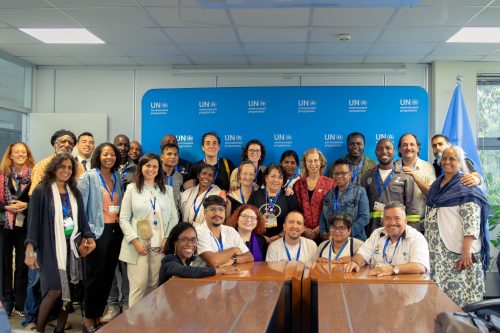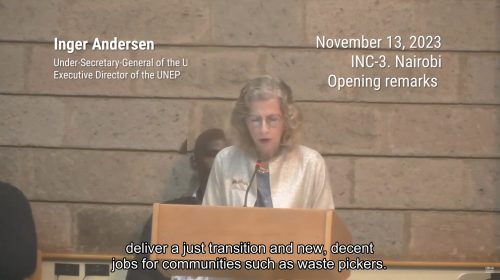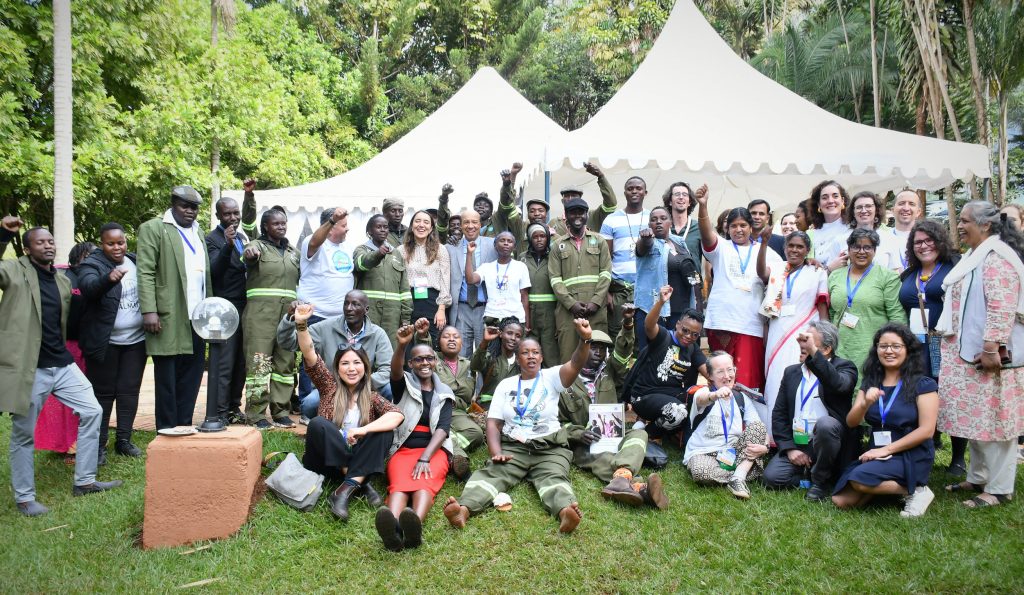
The International Alliance of Waste Pickers (IAWP) at INC 3
A delegation of 10 waste pickers from nine countries, across five continents (Africa, Asia Pacific, Europe, North and Latin America) participated in the 3rd Intergovernmental Negotiating Committee (INC-3) in Nairobi to present their perspectives during the ongoing negotiations for a Global Plastic Treaty. With more than 20 million waste pickers across the world, the Plastics Treaty may have a significant impact -good or bad- on livelihoods around the world.
The delegation of waste pickers at INC-3 included: Barbra Weber (Ground Score, USA), Gisore Nyabuti (KeNaWPa, Kenya), Harouna Niass e(Bokk Diom, Senegal), Indumathi (TSS, India), John Chweya (KeNaWPa, Kenya), Kulsum (WPUB, Bangladesh), Madhitlare Koena (SAWPA, South Africa), Pietro Luppi (Rete ONU, Italy), Severino Lima Jr. (UNICATADORES Brazil), and Soledad Mella Vidal (ANARCH, Chile). The Kenya National Waste Pickers Welfare Association also participated in INC-3 with four members: James Githae, Maulidi Hamisi, Winfred Wanjira, and Victor Onyango.
Waste picker demands during INC3 included:
- Incorporate the term ‘waste picker’ into the treaty text.
- Cross-reference just transition throughout the treaty text, including in the objective.
- Define the term waste pickers, just transition, and workers in informal and cooperative settings.
What Happened at INC 3

Inger Andersen, UNEP Executive Director & UN Under-Secretary-General, in her opening remark, declared: “This deal must also strengthen the systems for reducing, reusing, and refilling and recycling. Improve the environmentally sound waste management and disposal. Deal with the legacy of plastic pollution that washes up on our shores, and of course, deliver a just transition and new, decent jobs for communities such as waste pickers.” Watch video.
Valentina Sierra, Permanent Mission of Uruguay to United Nations, On Behalf of GRULAC (Group of Latin America and the Caribbean) said: “The Treaty should be guided by the principles of just transition, including an inclusive transition for waste pickers”. Watch video.
As the INC progressed, different Member states heard, listened to and presented voices of waste pickers delegates during plenaries, official side events and contact group meetings. In this INC-3, 32 member states directly mentioned “waste pickers” or “informal sector” in their opening statements, plenary or contact groups.
The International Alliance of Waste Pickers (IAWP) also organised and participated in side events, such as the presentation of its position paper “For a Just Transition for Waste Pickers under the UN Plastics Treaty” at the Brazilian Embassy in Nairobi, during which we received support from various Member States. Watch video of the presentation.
Despite the gains made this week on a just transition and waste picker inclusion in the treaty, the International Alliance of Waste Pickers remains concerned about the failure of member states to come to timely consensus on the need to deliver an ambitious treaty to end plastic pollution.
For more details about IAWP participation at INC-3 check: dedicated web page.
What IAWP achieved
By the close of INC-3, IAWP achieved the following:
- In addition to the independent proposed article on just transition, just transition is referenced in the proposed objectives, and the proposed articles on extended producers responsibility, capacity building, technical assistance, technology transfer, and national plans to deal with plastic pollution.
- Member States agreed to list the terms waste pickers and just transition for definition.
- Waste pickers, safeguarding livelihood and improving income and strong social safety net, are mentioned in the just transition article of the draft treaty text.
What’s Next
For INC-4, in Canada, IAWP will continue to push for strong provisions for just transition in the treaty text, as well as the mention and accurate definition of waste pickers.
Why are Waste picker voices important during these Negotiations?

Waste pickers are among the most precarious workers within the plastics value chain. We are often excluded and stigmatised due to our identities and the nature of our work. However, waste pickers play an essential role in the global plastic waste management system and account for up to 85 percent of recycling chain workers, globally. Waste pickers collect and sort recyclable plastic materials, which helps to reduce pollution and conserve resources.The plastics treaty can set standards that will improve work conditions in the materials management sector. But if not designed to ensure a just transition, it could alternately disrupt the sector in ways that harm waste picker livelihoods.
Often in global negotiations the voices of precarious workers are missing. Those who are most impacted are rarely invited to decision making fora. Through consistent involvement in Intergovernmental Negotiating Committees, waste pickers are advocating for the needs of marginalised workers in informal and cooperative settings. Their voices must be heard at all levels of decision-making, from local to international. In the past year since United Nations Environment Assembly 5.2 (UNEA 5.2), waste pickers have been the leading voices asking for a just transition for themselves as well as other workers in informal and cooperative settings.
Tweet

